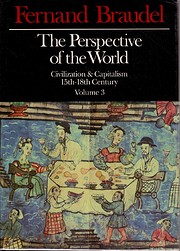

Auf ein Miniaturbild klicken, um zu Google Books zu gelangen.
|
Lädt ... Aufbruch zur Weltwirtschaft (1979)von Fernand Braudel
 Keine Keine aktuelle Diskussion zu diesem Buch. The third volume in Braudel’s classic Civilisation and Capitalism, The Perspective of the World, is concerned with the highest of the three levels, the operation within the economy of capitalism itself. Credit. In many ways this is the most conventional of the three volumes. It begins with a theoretical chapter, defining terms and mapping out a strategy. Then it looks at the development of capitalism in Europe, Asia, India, Africa and the Americas: a chronological economic history of the world, then. The pointillism and synchronic double vision of the first two volumes is replaced by a more traditional historiography in which narrative is balanced by analysis, primary source with secondary source. The volume begins with an examination of the concept of a world-economy as distinct from the world economy (the translator here is beyond excellent). This is not a concept original to Braudel, but he develops it, takes issue with it, refines and complicates it, adding a historical dimension. World-economies have certain features which define them... Read the full review on The Lectern: http://thelectern.blogspot.com/2008/10/perspective-of-world-fernand-braudel.html keine Rezensionen | Rezension hinzufügen
The concluding volume of the trilogy charts the growth of the world economy from the fifteenth to the eighteenth century concentrating on the human activity that underlies the business of life ¿ the bustle of the market, the great manipulators of capital, the labour of the slave, the peasant and factory workers, the fashions of the rich and the rise of the great financial centres of Genoa, Venice, Amsterdam and London. Keine Bibliotheksbeschreibungen gefunden. |
Aktuelle DiskussionenKeineBeliebte Umschlagbilder
 Google Books — Lädt ... Google Books — Lädt ...GenresMelvil Decimal System (DDC)909.08History and Geography History World history 1450/1500-, modern historyKlassifikation der Library of Congress [LCC] (USA)BewertungDurchschnitt: (4.27) (4.27)
Bist das du?Werde ein LibraryThing-Autor. |
||||||||||||||||||||||||||||||||||||||||||||||||||||||||||||||||||||||||||||||||||||||||||||||||||||||||||||||||||||||||
This final volume of Braudel was often both enthralling and crushing but not ultimately as satisfying as the first, The Structures of Everyday Life. I base that verdict on two observations: 1) the first section is almost entirely a response to Immanuel Wallerstein's theory of the Core and the Periphery and 2)the slight shift of focus afforded the east, particularly China. The first objection was very topical as Wallerstein's books on World-Systems were all the rage when Braudel's The Perspective of the World was published and translated. I don't understand the second fact at all. Braudel was masterful in the first volume comparing Western Europe with Asia as well as the Americas. Maybe my inability to peruse the second volume (faulty spine) thwarted my appreciation here.
The Perspective of the World begins with the idea of a World Economy -- one operating on an inside outside basis from a particular city: Genoa, Venice, Antwerp, Amsterdam and London are the sequential hubs under discussion. How such grew in structure and complexity from medieval Champaign Fairs (routine meetings where merchants traded their goods) through advances in Banking until Colonialism coupled with Credit changes the world.
Around page 385 Braudel finally shifts focus from Europe to "non-Europe". The Americas, Muscovy/Russia and the Ottomans are discussed before arriving finally at India.
The tome concludes with an amazing analysis of the Industrial Revolution. This should've warranted another book, but one's industry doesn't spring eternal. I feel exhausted, but enhanced by the toil and certainly ready for more.
(